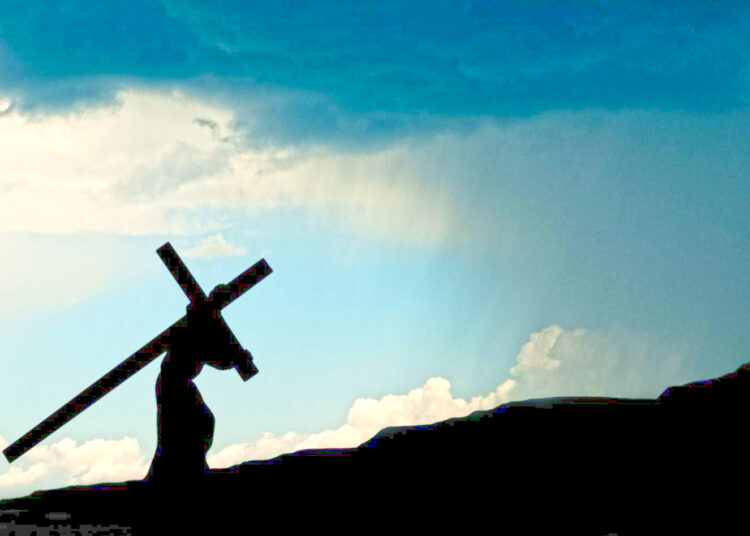As Christian faithful in Nigeria mark Good Friday today, it is important to reflect on the significance of this day and its relevance in contemporary times. Good Friday is the day when Christians all over the world commemorate the crucifixion of Jesus Christ and his subsequent death on the cross. It is a somber occasion that precedes the highest point in the Lenten Season, His resurrection on Sunday.
It is important to observe that Holy Week which prepares the faithful for the remarkable occasion starts with the triumphant entry of Jesus Christ into Jerusalem on Palm Sunday or Passion Sunday where He will experience His passion and death. The week also contains the Easter Triduum – Holy Thursday which is regarded as the day Jesus Himself established the Eucharist as a sacramental expression of his paschal mystery. It is a day also He instituted the Priesthood and the Holy Orders at the Last Supper. The Triduum reaches its apogee on Good Friday with His crucifixion. Holy Saturday is significant because the faithful wait in joyful hope for the resurrection of Jesus on Easter Sunday, the most important date in the annals of Christendom.
For Christians around the world and particularly in Nigeria, Good Friday is more than just a religious event; it is a day of deep spiritual significance that resonates with many people, regardless of their religious beliefs. It is a day when people come together to reflect on the meaning of sacrifice, love, and redemption. It is also a time to remember the suffering and death of Jesus Christ and the hope that his resurrection brings.
Good Friday ought to be an opportunity for Nigerians to reflect on the state of the nation and the challenges that we face as a people. Nigeria is a country that is grappling with numerous problems, including insecurity compounded by banditry, kidnapping and terrorism. Corruption, especially among the ruling elite, is generating issues that pose serious challenges to efforts to set the country on the right path of growth and development. In the midst of these, economic instability, social and political unrest are not helping matters. Put together, these issues have caused immense suffering and hardship for many Nigerians, and they continue to threaten the stability and progress of the nation.
In the opinion of this newspaper, this Good Friday, offers the people a time to ponder over what can be done to overcome these challenges and move forward. Primarily, it is an opportunity for Nigerians to reflect on the values of sacrifice, love, and redemption that are central to the Easter story and apply same to their lives and the wellbeing of the country. We must also remember that the Easter story is one of hope and resurrection, and that no matter how dark our circumstances may seem, there is always the possibility of renewal and rebirth.
As we mark Good Friday, we must also remember the importance of unity and solidarity. Nigeria is a diverse country with many different ethnic, religious, and cultural groups. It is our diversity that makes us unique and vibrant, but it is also a source of tension and conflict. We must learn to understand our differences and find ways to work together for the common good.
In recent years, Nigeria has witnessed an increase in inter-ethnic and inter-religious conflicts, which have claimed countless lives and caused untold suffering. These conflicts are often fueled by political interests, economic disparities, and social inequalities.
As we mark Good Friday, we must renew our commitment to building a more peaceful and harmonious society, where all Nigerians can live in dignity and security. Furthermore, on this Good Friday, we must also remember the vulnerable and marginalised in the society. Nigeria is a country where millions of people live in poverty, with limited access to basic services such as healthcare, education, and clean water.
According to a report by the National Bureau of Statistics (NBS) 133 million Nigerians are multidimensionally poor. This is unacceptable.
To put it in proper perspective, this is more than the population of the United Kingdom (67.33 million) and several European countries. The poor people in Nigeria are often the most affected by the challenges that face the nation, and they are also the ones who need support the most.
As we mark Good Friday, we must renew our commitment to address the root causes of poverty and inequality in the society. We must work towards creating a just and equitable society, where everyone has the opportunity to live a decent and fulfilling life.
Consequently, Good Friday is a day of deep spiritual significance for Nigerians, and it is an opportunity for us to reflect on true religious values that point towards salvation and life in the hereafter.
Above all else, we must not forget the real significance of this day when Jesus paid the ultimate price for the salvation of mankind. We should call to mind the relevance of sacrifice even in political and economic leadership.





